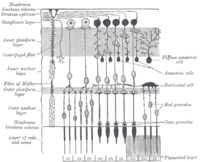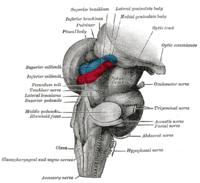
High-Mobility Group Box 1 Neutralization Prevents Chronic Cerebral Hypoperfusion-Induced Optic Tract Injuries in the White Matter Associated with Down-regulation of Inflammatory Responses
Sign Up to like & getrecommendations! Published in 2019 at "Cellular and Molecular Neurobiology"
DOI: 10.1007/s10571-019-00702-7
Abstract: Chronic cerebral hypoperfusion (CCH)-induced white matter lesions (WMLs) are region-specific with the optic tract (OT) displaying the most severe damages and leading to visual-based behavioral impairment. Previously we have demonstrated that anti-high-mobility group box 1… read more here.
Keywords: cerebral hypoperfusion; inflammatory responses; high mobility; optic tract ... See more keywords

Optic tract edema in craniopharyngioma as a predictor of BRAFV600E mutation presence.
Sign Up to like & getrecommendations! Published in 2023 at "Japanese journal of clinical oncology"
DOI: 10.1093/jjco/hyad003
Abstract: OBJECTIVE the advent of BRAF inhibitors for preoperative treatment of craniopharyngioma has necessitated the identification of BRAFV600E status. Hence, we investigated predictors of BRAFV600E mutation in craniopharyngiomas. METHODS this retrospective study utilized data from 30… read more here.
Keywords: optic tract; mutation; tract edema; brafv600e mutation ... See more keywords

Vertebrobasilar Dolichoectasia Causing An Optic Tract Syndrome.
Sign Up to like & getrecommendations! Published in 2017 at "Journal of Neuro-Ophthalmology"
DOI: 10.1097/wno.0000000000000495
Abstract: Vertebrobasilar dolichoectasia (VBD) is characterized by significant dilation, elongation, and tortuosity of the vertebrobasilar system. We present a unique case of VBD, confirmed by neuroimaging studies, showing vascular compression of the right optic tract and… read more here.
Keywords: causing optic; vertebrobasilar dolichoectasia; optic tract; dolichoectasia causing ... See more keywords

Cannabinoid Receptor Type 1 regulates growth cone filopodia and axon dispersion in the optic tract of Xenopus laevis tadpoles
Sign Up to like & getrecommendations! Published in 2022 at "European Journal of Neuroscience"
DOI: 10.1111/ejn.15603
Abstract: Previous studies show that the main cannabinoid receptor in the brain—cannabinoid type 1 receptor (CB1R)—is required for establishment of axonal projections in developing neurons but questions remain regarding the cellular and molecular mechanisms, especially in… read more here.
Keywords: optic tract; growth; growth cone; cone filopodia ... See more keywords

Bilateral Optic Tract Hyperintensity due to Pituitary Apoplexy
Sign Up to like & getrecommendations! Published in 2019 at "Internal Medicine"
DOI: 10.2169/internalmedicine.1515-18
Abstract: A 51-year-old man was admitted due to sudden headache, fever, and vomiting. A neurologic examination revealed neck stiffness, partial bitemporal hemianopsia, left ptosis, and ophthalmoplegia. Axial computed tomography and sagittal T1-weighted magnetic resonance imaging (MRI)… read more here.
Keywords: tract hyperintensity; bilateral optic; optic tracts; hyperintensity ... See more keywords

Alterations of optic tract and retinal structure in patients after thalamic stroke
Sign Up to like & getrecommendations! Published in 2022 at "Frontiers in Aging Neuroscience"
DOI: 10.3389/fnagi.2022.942438
Abstract: Objectives To investigate the association between degeneration of retinal structure and shrinkage of the optic tract in patients after thalamic stroke. Materials and methods Patients with unilateral thalamic stroke were included. Structural magnetic resonance imaging… read more here.
Keywords: thalamic stroke; patients thalamic; retinal structure; prnfl ... See more keywords